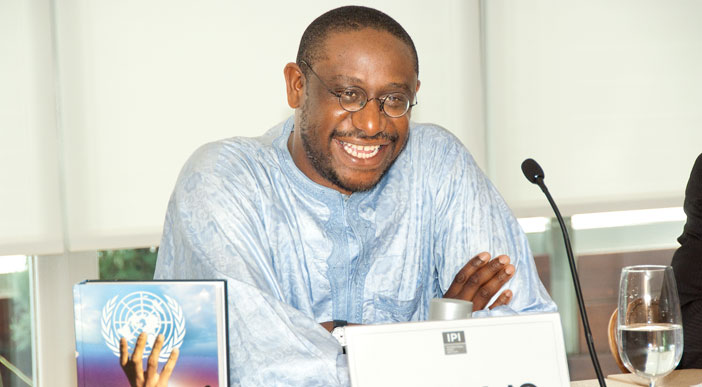
IPI’s Africa Program and the Centre for Conflict Resolution (CCR) in Cape Town, South Africa, organized the New York launch of the Centre’s latest volume, a comprehensive, provocative and engaging collection of studies on the role of the UN in Africa and of Africa at the UN.
The 30-chapter volume is entitled: From Global Apartheid to Global Village: Africa and the United Nations, and published by the University of KwaZulu-Natal Press.
Written by some of the most prominent pan-African scholars and policy intellectuals, many with practical first hand experience with the UN, the book explores the inequitable power relations between the North and South – what the volume refers to as “global apartheid.”
The book studies United Nations activities in the areas of peacekeeping, human rights and social and economic development, all centered on the work of sixteen UN specialized agencies, programs and funds.
“The concept of global apartheid describes the political and socio-economic inequalities that exist between the rich North and the poor South [and] these inequalities are deeply embedded in the world’s first truly universal organization — the United Nations,” said the principal speaker at the September 15th, 2009 event, Adekeye Adebajo. Dr. Adebajo is the editor of the volume, the director of CCR and the former director of the Africa Program at IPI when IPI was known as the International Peace Academy (IPA).
He was joined in the launch by two of Africa’s eminent diplomat-scholars – Augustine Mahiga, Permanent Representative of the United Republic of Tanzania to the UN, and Professor Francis Deng, the Special Adviser of the UN Secretary-General for the Prevention of Genocide. The panel was chaired by IPI’s Senior Vice President and Director of Studies, Dr. Edward Luck, who is also the Secretary-General’s Special Adviser for the Responsibility to Protect.
Speaking to a largely African audience, the panelists discussed how the UN should bring to bear the UN Charter’s ideals of justice and equality on the power politics of the world body which critics say manipulate the system to the disadvantage of the poor nations.
In that connection, Dr. Adebajo wondered how it is that six decades later, the global powers of 1945, who can no longer lay claim to economic and military dominance, still occupy all the permanent positions on the UN Security Council. “It’s a crying shame that we have a Security Council now that is the same as 1945,” he said.
He cited another distortion in the treatment of Africa by the great powers, using his characteristic bluntness, candor and unsettling wit. “The EU,” he said, “spends more on a cow than it does on an individual African in terms of aid.”
While Dr. Adebajo praised the contributions of Africans to the UN since 1945, he was critical of the current level of African diplomacy at the UN, arguing that improvements would better enable the continent to compete effectively in the rapidly changing global politics.
He also faulted African nations for not coming together economically. “The fact that less than 10% of trade is inter-African trade after 50 years is quite shameful,” Dr. Adebajo said, “Africans have to start actually promoting genuine regional integration. It is not enough to declare an African Economic Community in 2028, it’s important also to try to reverse those kinds of colonial-type patterns.”
In a concluding flourish, Dr. Adebajo pointed out that Africa “was the site of the Biblical Garden of Eden, which now is a garden that has fallen into decay. Ending political, peacekeeping, human rights and socio-economic global apartheid is the surest way to reverse this decay and enter the paradisiacal global village. Amen.”
Professor Deng explored the notions of sovereignty and state responsibility, asserting that “the idea that a sovereign power is responsible for the welfare of its citizens seems so obvious that it is difficult to remember that it is a normative concept of recent origin.” In his view, “the need to recast sovereignty as a responsibility to protect and assist the citizen is pertinent and imperative.”
Ambassador Mahiga maintained that the responsibility for protecting refugees and internally displaced persons must be matched by examples and not merely by rhetoric. He observed that Tanzania has hosted over 6 million refugees since 1959, and also offered citizenship to those who willed to stay. While he called for rich countries to step up in similar fashion, his contribution also raised questions from the audience on the notion of the “refugee”, with the observation that more refugees are spawned today by factors in poor regions of the world than by direct conflict.
full event transcript (pdf)







